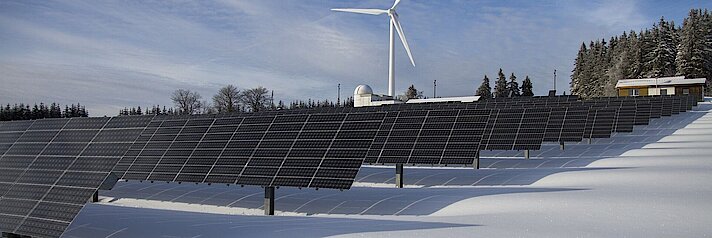Farewell to fossil fuels decided
At the COP28 world climate conference, the final text was adopted by almost 200 countries without objection. It calls for a global transition away from fossil fuels in a fair, orderly and balanced manner. This transition should be accelerated by 43 percent by 2030 and net zero emissions should be achieved by 2050. It is recognized that countries can shape the transition differently, for example to ensure energy security. In addition, the states agreed to triple the volume of renewable energy by 2030, increase energy efficiency and accelerate the development of zero or low emission technologies, such as nuclear power. The states are also striving to reduce inefficient subsidies for fossil fuels. Greenhouse gas emissions are to be reduced and financing packages for climate protection in developing countries and climate change adaptation measures are planned.
More electricity from renewable energies
The more renewable energies such as solar and wind energy are expanded, the faster we will achieve independence from fossil fuels. Germany is aiming to become climate-neutral by 2045. In order to achieve this goal, the expansion of renewable energies must be massively driven forward by 2030. The target for 2030 is to cover at least 80% of electricity consumption from renewable energies, particularly wind and solar energy.
In Germany, the share of renewable energies in the electricity sector is increasing from year to year. In 2021, it was still at 41.5%, one year later it was already at 46%. In the 3rd quarter of 2023, the share will even rise to 60%.
However, Germany's greenhouse gas emissions are falling too slowly
Germany is aiming to emit 65% less CO₂ by 2030 than in 1990, as stipulated in the Climate Protection Act. The aim is even to achieve complete greenhouse gas neutrality by 2045. The climate protection measures adopted by the end of August 2022 are clearly not enough to sufficiently reduce emissions by 2030. The German government's current draft for a climate protection program also does not appear to be sufficient according to the opinion of the Expert Council for Climate Issues, which was also published in summer 2023. However, it is still possible to achieve the German climate protection targets in all sectors by 2030 - this is shown by the Climate Protection Instruments Scenario 2030 published in summer 2023 on behalf of the Federal Environment Agency. A large number of climate protection measures, including more rail transport, a reform of the motor vehicle tax and restrictions on fossil fuel heating systems, could even make it possible to reduce emissions by 68% compared to 1990.
In 2023, around 7,050 tons of CO₂ emissions were offset with the Blue Planet Certifcate. In comparison: in 2022, around 6,850 tons of CO₂ emissions were offset. Support our nature conservation projects in the Hamberger Moor or in Costa Rica and become a climate partner now! Together we can counteract climate change!









